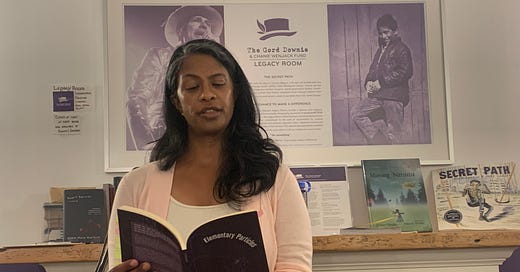Nada Gordon, from Emotional Support Peacock (2024): “First / Henry Grimes died, then John Prime, / then Ellis Marsalis Jr. But is the / earth as full as life was full, of them?” In a poem deliberately riffing a New York School/Frank O’Hara style, she marks off names and losses, referencing the usual sense of loss and configurations at the new world, one without particular individuals that were, until recently, alive and well in it. They were here only yesterday, one says. A list in my head of my own losses, here.
The way the sun sets in the west each night, seemingly to set in Thorold, as it has for longer than we can map. Perhaps far longer.
I draft a new author biography: “rob mclennan has recently declared himself ‘a writer to watch.’” I wonder if anyone might notice.
*
I catch a quote on social media, quoting Miles Davis: “The line isn’t wrong until you put the next one down, music is the same way.”
*
Last night we landed back in Picton just in time to deliver the children to father-in-law, and catch the monthly PEP Rally Reading at the local bookstore, curated by Leigh Nash and Andrew Faulkner of Assembly Press. The reading featured Ottawa poet Sneha Madhavan-Reese, Toronto poet Matthew Tierney and Toronto writer Spencer Gordon, all of whom were reading from new or recently-published books. It was good to catch all three, especially Madhavan-Reese, unable to hear her properly in the spring as part of VERSeFest. Any event I’m hosting or organizing provides me a divided attention, so the ability to focus on her reading was appreciated. Christine and I agreed that Madhavan-Reese [pictured, above] gave the strongest reading, in part due to her poem “Saṃsāra,” from Elementary Particles (2023), a poem titled from the Pali and Sanskrit word meaning both “wandering” and “world.” We appreciated her repetitions, looping echoes as a kind of cycle on progression, loss and connection. “After that,” Madhavan-Reese writes, “we had everything we could want, though / we didn’t want to leave it in the care of strangers.”
*
Diane Seuss, Modern Poetry (2024): “To never be touched again. That line / has a sound. Hear it?”
I’m poolside, attending our young ladies, who take turns doing flips in the shallows. Christine and her father, errand.
I’m still thinking about the effectiveness of Madhavan-Reese’s loops in that particular poem, how her repetitions moved further and around, allowing each phrase and new and singular weight, however many times they appeared.
*
Excerpt from an imaginary interview:
Q: What do you think about Charles Olsen?
A: You ask about the invention of the wheel, which I do not think about, yet a car affords me opportunities that would have been impossible without it.




